Thou shalt not intentionally provoke The Beast.
From the contributors of Where Angels Fear to Tread who sprinkle references to pop culture, contemporary music, athletic axiomata, show tunes, classical literature, and historical quotations, this writer provides invocation from an untapped store of framing that fits best the emotions and storylines that will unfold at Lynah Rink on Friday, Saturday, and, possibly, Sunday.
The world of sports entertainment is that reserve. No, I do not mean the real niche that all athletes, commentators (hey, hope you enjoy the show!), and spectators fill. What this contributor means is the only subdivision of athletic entertainment that is honest enough to call this enterprise what it is: World Wrestling Entertainment.
There was clawing and gnashing. The signature finishers of each were executed with regularity. Tombstones were laid. F-5s were whirled. Both of these titans of their universe brought every ounce of intimidation, skill, and brutality. When the match ended, it was Brock Lesnar who wrested the Deadman's shoulders to the mat for "the three-second tan."
Just. Like. That. Invincibility disappeared. The vaunted careers of sports-entertainment icons whose celebrities sometimes crossed into the mainstream had been written defeats on 21 consecutive occasions at Wrestlemania. Eyes widened. Jaws hung agape. A truth became false. Lesnar, a champion of several sports, was the better of one of the greatest performers.
There was no more story to tell. All that needed to be decided was settled. It was over, right? Until Battleground 2015.
Brock Lesnar was in the midst of doing what he had done for over a year. His domination was apparent. From music hit to final fall, opponents knew when they faced him, they could not win fairly. The multisport champion was obliterating then-heavyweight champion Seth Rollins. Lesnar was on the verge of his second title reign in less than the year and a half after he broke The Streak. He held the title for 224 of the 469 days between Wrestlemania XXX and Battleground 2015.
When the moment to pin Rollins presented itself, the building's lights cut. The Undertaker stood before Brock Lesnar when the arena regained illumination. 'Taker would prevent Lesnar's third reign and allow Rollins to retain. The story was incomplete.
Everyone assumed that the tale, the rivalry, between these combatants was over at Wrestlemania XXX. They were wrong. Their match-up became the top-billed and main event of Summerslam 2015. There was one chapter left to be told.
The match at Summerslam ended in controversy and pitched emotion. Lesnar avoided a pin because the in-ring official was out of position to see that the shoulders of The Beast Incarnate, as his manager, Paul Heyman, dubbed him, rested for a three-count. The re-positioned referee did not see that The Undertaker feigned tapping out when in a submission hold moments later. The bell rang. Lesnar relented. The referee never decided that match. The Demon from Death Valley took advantage of the situation with a low blow. A weakened Brock Lesnar was easy prey for the Deadman who held his opponent in his signature submission move. Lesnar collapsed. 'Taker won officially.
The story seemed tired to some. What else was there to decide? There was a fitting split in the high-stakes contests.
Then, the stipulation came. The Beast wanted a rematch. He wanted it with the greatest, most brutal advantage to The Undertaker. The match would be a Hell-in-a-Cell match. Trapped inside a five-ton steel cage on five sides with no disqualifications, this series would be decided one last time. Another false ending led to a most brutal encounter.
Hell in a Cell, for those who do not know, is known as The Undertaker's match. Its nickname as "the Devil's playground" pays homage to this reality. If there was a match believed to confer a home advantage to The Undertaker, it is this one.
Lesnar entered the cell. He exited with victory. The Beast and Deadman brutalized each other within the only confines rigid and unforgiving enough to confine the id of their current rivalry. Lesnar destroyed the ring in the process. He ripped the canvas from the ring. He exposed the hard wood below it. Willingness to go to these extremes gave Lesnar victory.
It was the last episode in the contemporary Lesnar-Undertaker saga. It followed two false endings. It was utterly decisive.
Why does this writer bore you readers with familiarizing you with this story in excruciating detail?
Brock Lesnar and The Undertaker is Cornell and Union.
Currently, the home-standing team loses in campus meetings. Union fell at Messa Rink in 2008. Cornell fell at Lynah Rink in 2015. That trend may be shored up or proven a product of small sample size this weekend.
This contributor's personal preference is to point to the 2010 ECAC Hockey Final as the germ of Cornell-Union's becoming ECAC Hockey's present analog for Lesnar-'Taker. It was the first season that the Dutchmen advanced from their domed home. They defeated St. Lawrence in a thrilling semifinal. Then, the juggernaut of ECAC Hockey brought them back to reality.
Cornell knew it was better at that point. It had proven it. Union went on to win the regular-season title in the 2010-11 season. Rick Bennett took the head coaching position a few weeks later. Bennett led teams that appeared in the Frozen Four and won two Whitelaw Cups. There was one thing that they could not do: beat Cornell. That is, until the 2013-14 season.
Union defeated the Red by a seven-to-one margin that regular season. Cornell and Union both advanced to Lake Placid in ECAC Hockey's homecoming. They would cross sticks in ECAC Hockey's first playoff game there in 12 years.
These were the playoffs. The regular season did not matter, coaches, players, and the Lynah Faithful told themselves. Cornell wins in the playoffs. The Big Red always was a playoff team. It would be one always, right? This sense of invincibility still pervaded the Lynah Faithful. It was a confidence identical to that associated with The Streak.
No program in ECAC Hockey had won three consecutive Whitelaw Cups except Cornell. It fell to the 2013-14 team to defend the legacy and honor of the Cornell teams that won four consecutive Whitelaw Cups between 1967 and 1970. The 2014 ECAC Hockey Semifinal provided Cornell with the opportunity to preserve its program's distinction. The prologue was dense.
Union gained a two-goal lead in the first period. The Red never could erase it fully. Union won. It was conqueror.
Confidence was shaken. The story was complete. Cornell taught Union dominance in 2010. The Dutchmen demonstrated how well they had learned its lesson on March 21, 2014. Nothing more needed to be known.
Cornell and Union both tumbled to the lower rungs of ECAC Hockey in the 2014-15 season. They were destined to meet again. The 2014 ECAC Hockey Semifinal was a false ending. The next tale was one of redemption and perpetuity.
The challenge of perpetuity laid not with the program of 12 Whitelaw Cups as one might have expected. It rested with the newly minted three-time Eastern champions and national champions. They needed to prove that despite slipping to the lower reaches of ECAC Hockey during the regular season that they still could achieve greatness without a big-game performer like Dan Carr and modern-day legends like Mat Bodie and Shayne Gostisbehere. They needed a great challenge.
Lynah Rink was that challenge.
The Red had hosted 36 playoff series at Lynah Rink. Cornell wins 90% of them. Only four times before last season had East-Hill natives been denied playoff satiation at home in nearly five decades of the building. Union accepted the gauntlet.
Cornell's challenge? Do what it could not the previous season. Stop Union's march to history. The likelihood was small for Union to win a fourth consecutive Whitelaw Cup with the burden of pursuing a playoff title entirely on the road. The odds were no steeper than they were against a non-scholarship athletic program of a small liberal-arts college of 2,300 winning the sport's greatest prize. A fourth consecutive Whitelaw Cup would tie Cornell's unequaled dynastic run.
There was no sense of invincibility after the debacle at Lake Placid. Union never trailed. 4-2. 7-0. The Dutchmen were better.
It had to be the final chapter. Union in this period was Cornell's superior. The Dutchmen removed the confidence that Cornell hockey is one of absolute playoff dominance and championships from an entire generation of Cornellians. The 2014-15 season ended the earliest of any Cornell season in 22 years. Cornell sat home impotently during the 2015 ECAC Hockey Quarterfinals as Quinnipiac did what the Big Red could not: halt Union's march to a record-tying fourth consecutive title.
It was the end of this chapter in Cornell hockey history. That is what the contributors of Where Angels Fear to Tread believed. The half-decade-long rivalry between Cornell and Union had ended. It was glorious. It was one of few such rivalries during which Cornell found itself on the losing side. It was fitting. It was Union's era. That was until 9:31 pm last Saturday.
A third chapter is to be authored. Now, college hockey may not enjoy the artistic direction of any Levesques or McMahons, but the recluses of one eye seem now no less talented in keeping their audience ignorant. An unexpected chapter lies before the Lynah Faithful in what is becoming one of Cornell hockey's greatest series of all time.
Reader, do you find yourself asking how this coming chapter is Hell in a Cell for The Undertaker and Brock Lesnar of ECAC Hockey? Yes, this is the Hell-in-a-Cell match. This writer thought last season was that episode. It is yet to be played. The denizens of Lynah Rink this weekend will be in for a treat of true attrition.
It's time for some honest disclosure. This commentator never roots for Cornell to lose. My blood runs carnelian in more than a literal sense. However, Union was his desired opponent for the 2016 ECAC Hockey First Round. While the Lynah Faithful held their collective breath and hoped for the late-addition Ivy to be the Red's first postseason opponent, this writer wanted an opponent that truly would test the timber of this team early. If it defeats Union, it has the right to advance with confidence.
This contributor desired Union as an opponent in much the same way that he celebrated Jimmy Vesey's announced return last season. It is out of no sense of diminution to an opponent. It is quite the opposite. When Cornell wins, this member of the Lynah Faithful wants it to mean something. Opponents should provide the sternest tests, not the smoothest road. Union is the only program out of those traveling in the first round that presents that type of challenge. The Dutchmen own as many Whitelaw Cups alone as do the combined totals of the remaining traveling three.
Cornell is a great program. Its opponents on the road to any championship should be great programs. Union is such a program. Consider Harvard's seven-game run to its ninth Whitelaw Cup last season. The Crimson's entire run eliminated programs that accounted for only three Whitelaw Cups through four opponents. Union alone provides that challenge.
The task is great enough. How do the odds compare? Cornell lost the chance offensively to preserve its distinction among programs in ECAC Hockey. What else can remain? In a word, revenge. In another word, defense.
Never mind that Union did not sweep Cornell this season. The Dutchmen twice outplayed and effectively defeated the carnelian and white even if one of the results was a recorded tie. Anthony Angello channels the right sentiment headed into the series against Union, "we definitely owe it to them to get a little revenge." Union seeks history of its own in this meeting.
Union ended Cornell's season in 2014 and 2015. Only five programs in 54 years can say that they ended the Red's playoff runs in consecutive years. The Dutchmen constitute one of only four programs to have won a playoff series at Lynah Rink. Only one program owns more than one playoff series victory on East Hill. Union can tie that total with a win this coming weekend. Union can put itself on a tier of its own. No program ever has eliminated Cornell in three consecutive seasons.
The 2015 ECAC Hockey First Round was Summerslam 2015. There is no doubt that this coming weekend is Hell in a Cell. The series will be physical, its games brutal. They will be exactly what will be required to send either great program on a run that should reach Lake Placid. It will be a series befitting two decorated Harkness programs. Notice a word used throughout?
Rival. Cornell is a rival of Union. Union is a rival of Cornell. Seniors at Cornell University are not fortunate enough to see carnelian's Crimson-clad nemesis as their final opponent at Lynah Rink. Garnet is this era's next best thing. Rejoice, soon-to-be alumni, and see if you get the senior night of which Coach Schafer lamented last season he deprived your peers.
Last season was a false ending to this era's Cornell-Union rivalry. To call the frequency and emotion of playoff confrontations in such a small amount of time by another word would be to abrogate this commentator's duty in writing a rough draft of history. An unexpected chapter is about to be written. The elements of its prose are already known.
The Dutchmen count 11 of their 15 point talliers and five of their eight goal scorers from last season's playoff series on the roster that will brave Lynah Rink for a second time in as many seasons. Three of Union's goal scorers from that series notched goals against the Big Red already this season. Spencer Foo, Eli Lichtenwald, and Matt Wilkins continued their scoring ways against the most decorated Harkness program into the recently ended regular season.
Cornell returns two-thirds of its unsatisfactory playoff point totals from last season's first round. Matt Buckles and Christian Hilbrich continued their trends of scoring against the Dutchmen that they began last March. Hilbrich likely is the skater to whom to turn against the challengers from the Capital District. The towering forward averages 0.67 playoff goals per game against Union. The Red needs to find other sources of scoring now. There is no tomorrow.
Cornell bested opposing netminders an average of 1.78 times per game from the Florida College Hockey Classic through the regular season's conclusion. The Red was 73.6% more lethal from the season's opening game against Niagara through hosting Clarkson at Lynah Rink. That Cornell team averaged more than three goals per game. That Cornell team could have won a Whitelaw Cup. That team needs to return.
Yes, as many have said, playoff games are not infrequently one-goal affairs. They are just as commonly scoring slugfests. Union can win such slobber knockers. Can whatever team lines up for the carnelian and white?
One-goal affairs they may be, but who is to say that the rendezvous point is not at 4-3, 5-4, or 6-5? Mitch Gillam can win games 1-0. He cannot win all games 1-0. He will be particularly motivated to establish himself as a Cornell playoff goaltender after last season. His team will need to provide all assistance that it can. This team needs to be able to prove that it can raise the ante and counterpunch with a hopeful six-game event lying before it. Otherwise, it will be another long abbreviated March.
Who owns The Streak? Was it broken in the 2014 ECAC Hockey Semifinal? Is Union its current possessor with consecutive playoff victories? Reservations and inhibitions vanish when these two programs meet again in a grudge match for the ages. What is certain is that when the ice-resurfacer door slams shut before the puck drops, this series will be Hell in a Cell.
It remains to be seen which is Beast.

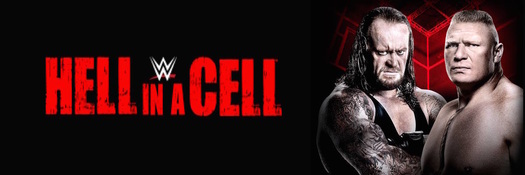
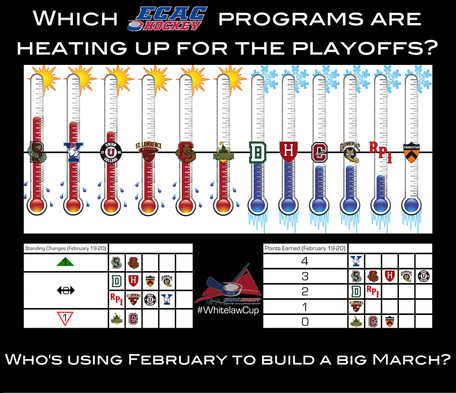
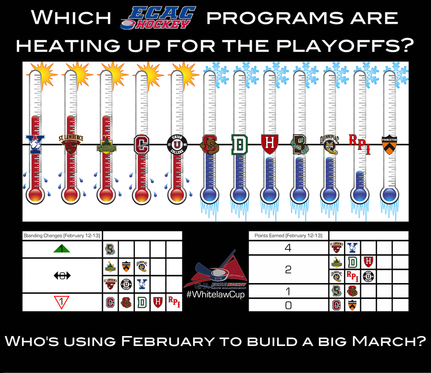
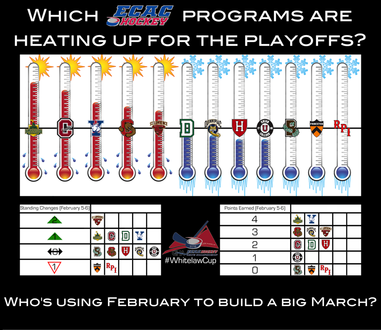
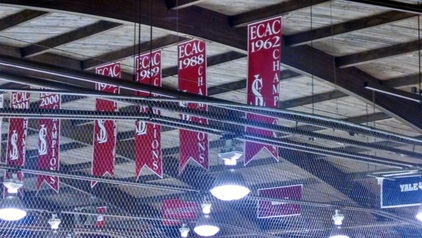
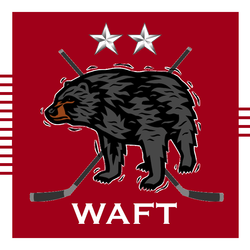

 RSS Feed
RSS Feed
